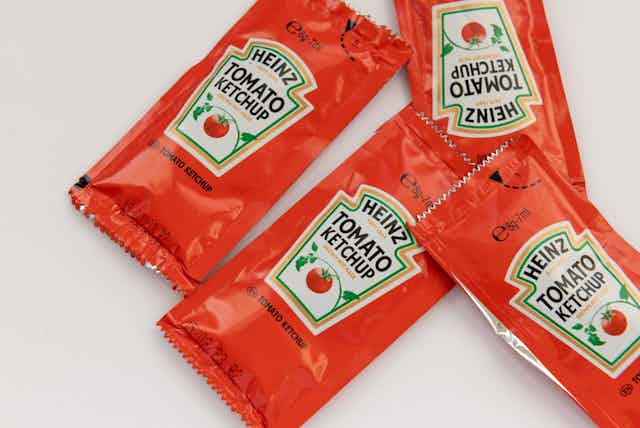In the world of endurance sports, how athletes fuel themselves can be the difference between success and struggle. Traditionally, athletes have relied on specialised energy gels for a quick and easily digestible source of carbohydrates during extended workouts. But now a surprising contender has emerged: Heinz ketchup packets, thanks to a new ad featuring runners using them as their supplement of choice.
Taste is a crucial factor when choosing supplements, especially during strenuous endurance efforts. Traditional sports foods offer various flavours to cater to athletes’ palates. Heinz ketchup packets bring a familiar tangy taste, but the savoury nature of ketchup might not appeal to everyone during a workout. Personal preference matters, as an unpalatable choice could lead to digestive issues and detract from an athlete’s true potential.
Endurance athletes need to consume carbohydrates for sustained energy during prolonged activities. Carbs are the body’s go-to energy source, especially during intense activities, and Heinz ketchup contains carbs primarily in the form of sugar from the tomatoes. Having a readily available option like ketchup packets could offer a crucial energy boost during training or competition, although the practicality might be a limiting factor.
For workouts lasting under an hour, ketchup packets might suffice. However, standard energy gels on the market have around 25g of carbs, and the recommendation for athletes engaging in longer exercises is 30–60g of carbs per hour. Each 10ml packet of ketchup contains 2.6g of carbohydrates. To meet the lower end of this range, runners would need about 12 ketchup packets per hour, posing a logistical challenge during a workout.
Opening and consuming multiple ketchup packets on the go may prove to be an awkward task, potentially detracting from an athlete’s focus and efficiency. As someone who struggles to open a single packet at the best of times, the practicality of relying on a dozen packets during a long run seems doubtful. This raises questions about the real-world applicability of Heinz ketchup as a sports supplement.
Additionally, sports gels often have added electrolytes such as sodium, potassium, and magnesium. These electrolytes are lost through sweat during exercise and replenishing them is important for preventing dehydration and muscle cramping during endurance activities. Heinz ketchup will contain some electrolytes due to the salt content, but sports gels are often scientifically formulated to provide a more precise electrolyte balance, making them the preferred choice for athletes.
Ketchup is also highly acidic due to the tomatoes and vinegar. Acidic foods may trigger heartburn and acid reflux, diverting your focus from peak performance. The combination of sugars and acid in ketchup can also wreak havoc on dental health – an often-overlooked factor in athletes. Sauces, such as ketchup, can harm teeth as they are sticky and can cling to them.
On a more positive note, tomatoes contain compounds like lycopene and carotenoids. These antioxidants have been shown to reduce markers of muscle damage after an endurance run.
Impractical packets
While ketchup packets may not enhance immediate performance, they could aid recovery following endurance exercise. However, consuming enough of these beneficial compounds from ketchup seems impractical.
If you enjoy ketchup, it can still be included in your diet in moderation. The reality is that the occasional packet is not necessarily going to stop you performing well. However, it is not likely to be a worthwhile supplement.
As a sports nutritionist, my advice if you are considering using Heinz ketchup as a sports supplement is to experiment with it in your training regimen before incorporating it into any important competitions. Testing its compatibility with your body and performance goals ensures that you are making informed choices about your fuelling strategies.

